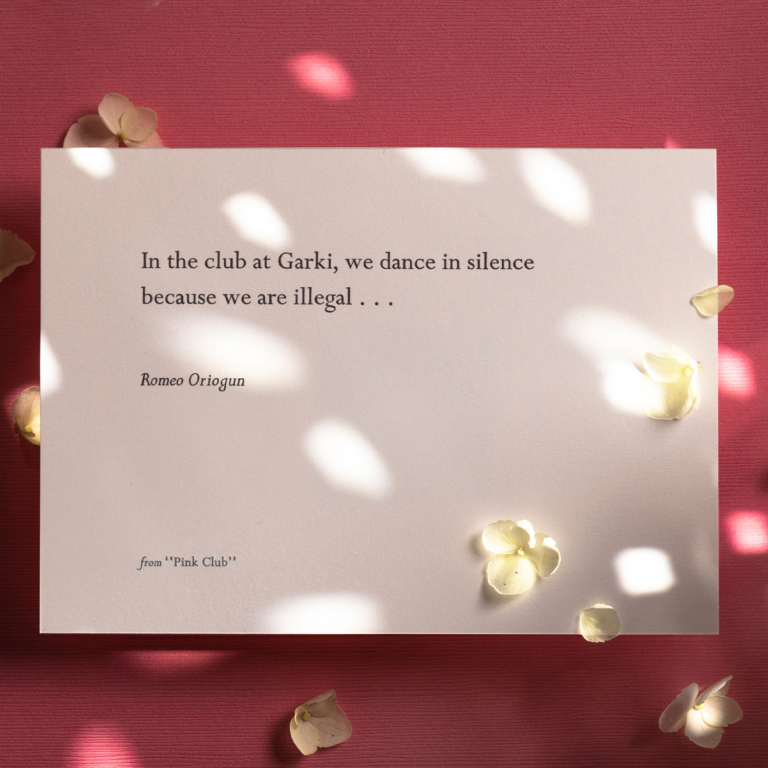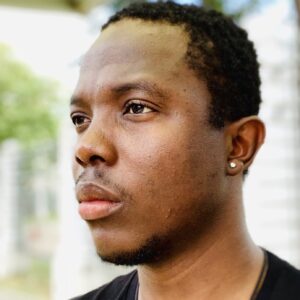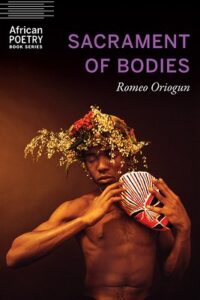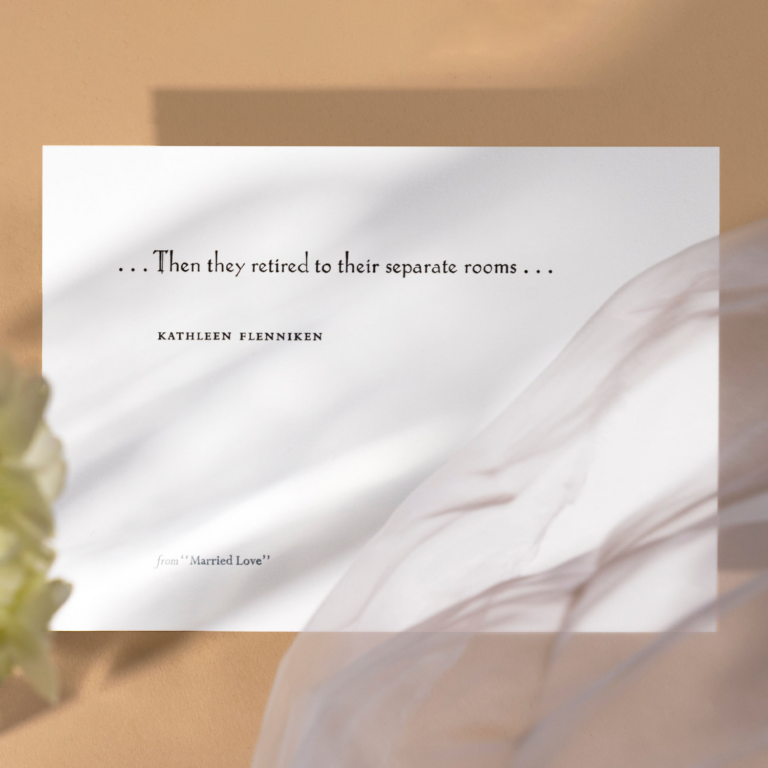Romeo Oriogun
Pink Club
A club is a place for dancing, for abandon, for music, and for meeting strangers. Romeo Oriogun recalls a gay club that was for all those things, but also for escape. Living in a place where queer lives were under threat, he offers a praise song for this cathedral of safety and movement. Outside the world is silent, but inside the bar, people carry stories of their own desire, of their families, of their hopes; both for the future and the present.

Letterpress prints by Myrna Keliher | Photography by Lucero Torres
Guest

Romeo Oriogun is a Nigerian poet, essayist, and author of Sacrament of Bodies (University of Nebraska) and three chapbooks. He is the winner of the 2017 Brunel International African Poetry Prize. His poems have appeared in Poetry, Harvard Review, American Poetry Review, Poetry London, The Poetry Review, Narrative Magazine, The Common, and others. A graduate of the Iowa Writers’ Workshop, his poems have been translated into several languages.
Transcript
Pádraig Ó Tuama: My name is Pádraig Ó Tuama, and the first time I went to a gay bar was the time I almost went to a gay bar. I went to the door and knocked, and somebody opened it and said, “Hello.” This was in the mid ’90s. Things were pretty secretive for the LGBT community in Dublin. When I said hi, the guy said, “You know this is a gay bar, right?” And I breathlessly said, “Yes.” And he closed the door, in order to take off the chain, and I fled. I couldn’t bear the idea of going in and being faced with the possibility of all the freedom that lay inside. It was much easier to go back to the constraint and the fear that I had.
[music: “Praise the Rain” by Gautam Srikishan]
“Pink Club” by Romeo Oriogun:
“In the club at Garki, we dance in silence
because we are illegal, because the man
who tastes of gin also tastes of fear,
because the club is hidden in the eye of the night,
in a place where man dancing into another man
is a beautiful song humming deep within my veins,
I want to know heaven in the mouth of a boy
and we are crying because we are free,
because there’s no sin inside dance,
because your father’s voice is a far country
where sadness resides, call it home,
call it a place where boys who taste of flowers
are stolen at night.
You know sanctuary is where you run
into anyone that calls you home.
The drag queen dancing close to you
tastes of whiskey, you want to lie inside her,
close your eyes and walk away into her voice,
you want to fill your bones with wine
till a boy swims into your hands.
The bar sings of freedom, we keep wrecking it
because for once you are a butterfly
fluttering on the tongue of a boy
who called you beautiful.
I’m lying on a sofa because I’m dreaming
of cities filled with freedom,
because I’m free to drink pink gin from a pink bar.
Abuja sleeps because I’m free to raise
a city where boys who love other boys
are free to hold hands on the street.
You are laughing because this is strange,
because the first time you heard about this club
you thought about the boy who met love on Facebook,
who walked through his fear to meet a lynching
in a dark street, who couldn’t report to the police
because a gay man is a fire waiting to happen.
Neon lights run along our limbs as we lose ourselves to dance,
the day is on my tongue, I’m tipsy,
all I want to do is sit before the sun
and drink rainwater on the skin of the boy
who called my mouth a city of refuge.”
[music: “Ashed to Air” by Gautam Srikishan]
This poem from Romeo Oriogun is about him being gay in Nigeria, but also a poem about so many people in so many other parts of the world. I think there are people from every city, every rural place, every country, who will feel like the pressures on them, and the way that they had to find a way to a club that was inclusive of LGBTQ people, all of that will be recognizable within the contours of this poem.
You know, poems are made up of stanzas. This is one big stanza spread out over two pages. And “stanza” is the Italian word for “room,” and the room of this poem is the room of a nightclub, the room of a cathedral, almost, a cathedral of freedom. They’re dancing in silence, so there is this presence of threat the whole way throughout the poem. But in the middle of the presence of threat, there’s this extraordinary promise and dream and grasping of freedom and what it means to have your imagination free, to be yourself, to be able to tell the truth, to be able to lounge back, to dream of cities of freedom.
[music: “At Dusk” by Gautam Srikishan]
There’s a powerful sense of home in the poem. And home is “a place where a man dancing into another man / is a beautiful song.” And home is a place that you’re being called to. Home is humming in his veins, in the poem. Home is heaven, kissing another boy. And then home, too, is being brought to the imagination when he’s dancing next to the drag queen. He wants to lie inside her. There’s something about her voice that makes him feel like home. Is that because she reminds him of somebody, or because freedom and safety feels like home? I think it’s a little bit of both. So escape and arrival, or home and exile, are beautiful themes within this poem.
There are so many people of all genders and sexualities who’ve known what it’s like to dream of the freedom of leaving, even though you perhaps don’t want to be forced into leaving. That home already feels like exile, and that exile might feel like home, but exile will always feel like exile, too. You feel torn, when the possibility of safety isn’t offered to you.
There’s sadness in this poem, too, alongside love — “your father’s voice is a far country / where sadness resides, call it home.” It’s where sadness resides. While there’s violence the whole way throughout this poem, there’s only sadness attributed to the father’s voice here, and within the context of this, you can see how families can be caught up in a system of homophobia, in a system of transphobia, in a system of threat.
It can be easy to think that this poem is about the experience of homophobia in one country, whether that’s from a government, from a police, or from people on the street. But this poem really opens up a door to so many places where this is the case. There’s currently 69 UN member states that criminalize LGBT activity. But there’s plenty of other places where our lives are at threat, too. When I was growing up, the idea of going to New York or Toronto, for some people, was seen as an escape to a great city where being gay was OK. But my experience of hearing about those cities was to go to a place where there were large outfits of places that could repair you, that could cure you, that could exorcise you of being gay.
So just because a city is in a place of freedom, it doesn’t mean that that city is a place of freedom for everyone in it. And just because there’s one country being mentioned in this poem, it doesn’t mean that this poem is only speaking about that country. All countries where LGBT lives are unsafe are implicated in the experience of this poem, in the threat of this poem. But all imaginations of LGBT people, who are yearning for freedom and yearning for structures that guarantee and provide for freedom, are also being implied in the imagination of Romeo Oriogun, in this poem.
[music: “Every Place We’ve Been” by Gautam Srikishan]
Threat is an ever-present presence in this poem. You know, they dance in silence because they’re illegal; “the man / who tastes of gin also tastes of fear.” The club’s hidden. And there’s a reference to “boys who taste of flowers” being “stolen at night.” And what’s so interesting then, is that there’s this line: “The bar sings of freedom, we keep wrecking it.” In the midst of threat and freedom, he responds by “wrecking.” I find that so very interesting. There’s a way within which Romeo Oriogun is profoundly wise about what it’s like to lose yourself after having been refused your freedom. And when you get it, wrecking and dancing and abandonment are all part of the same energy of release. And the violence of repression that’s stored up in the body and stored up in so many of us has to find a place to go. And where does it go, in the context of this poem, in a place of freedom? They wreck the bar.
I think that’s so wise to include that in there, that a place of abandonment here is also something like a therapeutic wrecking room, because the energy that you’ve had to hold together explodes.
[music: “Cirrus” by Blue Dot Sessions]
Romeo Oriogun is a Nigerian poet, who has been studying and now teaching in the United States for the last few years. And this poem is included in a book called Sacrament of Bodies. And the whole way throughout this book, there’s a link between queer experience and colonial experience and liturgies of Christian sacraments. And so within the context of his work, the body is a poem, but the body is also a sacrament, especially the colonized, marginalized body.
And here, in this poem, we’re paying attention to bodies dancing. And there’s a way within which I think he’s saying something about elevating the body to the level of holiness, where you see holiness in the experiences that have been so hated and so marginalized. You even see this, perhaps, in the reference to the drag queen: “The drag queen dancing close to you / tastes of whiskey, you want to lie inside her.” This drag queen is an echo of Jesus. Instead of wine being referenced, it’s whiskey, and Romeo Oriogun has this desire to be born again within the context of dancing, in a place of safety, where he feels like home. And this is the possibility of being reborn again, to his own life.
[music: “At Dusk” by Gautam Srikishan]
I think this poem knows what the long-term impact of having to store up secrecy in your life and in your body is, what the long-term impact of living under threat or unsafety. And within the context of that, this poem knows what the expression of freedom looks like, but also quite how deep the yearning for freedom goes and quite how complex it can be to live with it, to dance with it, and quite how far it can seem, for so many people, that there could be a world, a city, a place, a day, a year long, where you could be free to hold hands with somebody on the street without wondering, who’s going to beat me up? Who’s going to threaten to beat me up? Who’s going to enjoy imagining beating me up?
All of those things are mirrors back to a world that projects violence on populations of people. And this poem knows what it’s like to live under that violence. And while it’s describing this small room of a club, dancing in silence, finding a small part of freedom, the burden shouldn’t be on the people who have to make their way to this room, to find their own freedom. The burden should be on the society to become freer and safer.
And that’s what this poem knows. And that’s what this poem is saying to a universal audience, not just to an audience of one country. This poem is understanding that the dreams of freedom that a person might have are valid. Toward the end of the poem, Romeo Oriogun seems to be lying on a sofa in the club, and he’s dreaming of whole cities of freedom. He’s raising dreams of cities where boys who love boys “are free to hold hands in the street.”
And then, also, he speaks about the day being on his tongue, and all he wants to do is sit before the sun; again, outside. There’s a desire in this poem that what is hidden could be revealed and that that wouldn’t be the end of the world, but the beginning of it.
[music: “At Dusk” by Gautam Srikishan]
“Pink Club” by Romeo Oriogun:
“In the club at Garki, we dance in silence
because we are illegal, because the man
who tastes of gin also tastes of fear,
because the club is hidden in the eye of the night,
in a place where man dancing into another man
is a beautiful song humming deep within my veins,
I want to know heaven in the mouth of a boy
and we are crying because we are free,
because there’s no sin inside dance,
because your father’s voice is a far country
where sadness resides, call it home,
call it a place where boys who taste of flowers
are stolen at night.
You know sanctuary is where you run
into anyone that calls you home.
The drag queen dancing close to you
tastes of whiskey, you want to lie inside her,
close your eyes and walk away into her voice,
you want to fill your bones with wine
till a boy swims into your hands.
The bar sings of freedom, we keep wrecking it
because for once you are a butterfly
fluttering on the tongue of a boy
who called you beautiful.
I’m lying on a sofa because I’m dreaming
of cities filled with freedom,
because I’m free to drink pink gin from a pink bar.
Abuja sleeps because I’m free to raise
a city where boys who love other boys
are free to hold hands on the street.
You are laughing because this is strange,
because the first time you heard about this club
you thought about the boy who met love on Facebook,
who walked through his fear to meet a lynching
in a dark street, who couldn’t report to the police
because a gay man is a fire waiting to happen.
Neon lights run along our limbs as we lose ourselves to dance,
the day is on my tongue, I’m tipsy,
all I want to do is sit before the sun
and drink rainwater on the skin of the boy
who called my mouth a city of refuge.”
[music: “Praise the Rain” by Gautam Srikishan]
Chris Heagle: “Pink Club” comes from Romeo Oriogun’s book Sacrament of Bodies. Thank you to the University of Nebraska Press, for giving us permission to use Romeo’s poem. Read it on our website, at onbeing.org.
[music: “Praise the Rain” by Gautam Srikishan
Poetry Unbound is: Gautam Srikishan, Erin Colasacco, Eddie Gonzalez, Lilian Vo, and me, Chris Heagle.
Our music is composed and provided by Gautam Srikishan and Blue Dot Sessions.
This podcast is produced by On Being Studios, which is located on Dakota land. We also produce other podcasts you might enjoy, like On Being with Krista Tippett, Becoming Wise, and This Movie Changed Me. Find those wherever you like to listen, or visit us at onbeing.org to find out more.
Books & Music
Recommended Reading
The On Being Project is an affiliate partner of Bookshop.org and Amazon.com. Any earnings we receive through these affiliate partnerships go into directly supporting The On Being Project.









Reflections